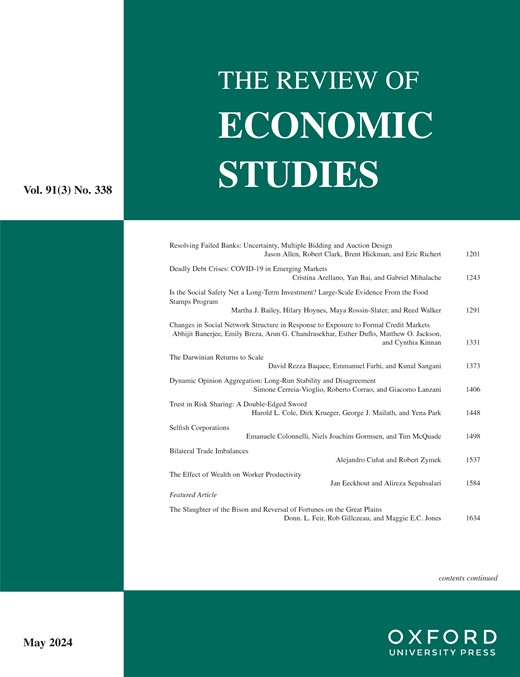The Darwinian Returns to Scale
IF 6.4
1区 经济学
Q1 ECONOMICS
引用次数: 0
Abstract
Abstract How does an increase in market size, say due to globalization, affect welfare? We study this question using a model with monopolistic competition, heterogeneous markups, and fixed costs. We characterize changes in welfare and decompose changes in allocative efficiency into three different effects: (1) reallocations across firms with heterogeneous price elasticities due to intensifying competition, (2) reallocations due to the exit of marginally profitable firms, and (3) reallocations due to changes in firms’ markups. Whereas the second and third effects have ambiguous implications for welfare, the first effect, which we call the Darwinian effect, always increases welfare regardless of the shape of demand curves. We nonparametrically calibrate demand curves with data from Belgian manufacturing firms and quantify our results. We find that mild increasing returns at the microlevel can catalyze large increasing returns at the macrolevel. Between 70 and 90% of increasing returns to scale come from improvements in how a larger market allocates resources. The lion’s share of these gains are due to the Darwinian effect, which increases the aggregate markup and concentrates sales and employment in high-markup firms. This has implications for policy: an entry subsidy, which harnesses Darwinian reallocations, can improve welfare even when there is more entry than in the first best.达尔文的规模回报
市场规模的增加,比如由于全球化,是如何影响福利的?我们使用一个具有垄断竞争、异质加价和固定成本的模型来研究这个问题。我们描述了福利的变化,并将配置效率的变化分解为三种不同的影响:(1)由于竞争加剧而在具有异质价格弹性的企业之间进行再配置;(2)由于边际利润企业的退出而进行再配置;(3)由于企业加价变化而进行再配置。第二种和第三种效应对福利的影响模棱两可,而第一种效应,我们称之为达尔文效应,无论需求曲线的形状如何,总是会增加福利。我们用比利时制造企业的数据非参数校准需求曲线,并量化我们的结果。研究发现,微观层面的温和收益增长可以催化宏观层面的大幅收益增长。70%到90%的规模收益增长来自于更大的市场如何配置资源的改进。这些收益的大部分是由于达尔文效应,它增加了总加价,并将销售和就业集中在高加价的公司。这对政策有影响:利用达尔文的再分配理论的进入补贴,即使在进入人数多于第一好的情况下,也能改善福利。
本文章由计算机程序翻译,如有差异,请以英文原文为准。
求助全文
约1分钟内获得全文
求助全文
来源期刊

Review of Economic Studies
ECONOMICS-
CiteScore
10.40
自引率
3.40%
发文量
75
期刊介绍:
Founded in 1933 by a group of young British and American economists, The Review of Economic Studies aims to encourage research in theoretical and applied economics, especially by young economists. Today it is widely recognised as one of the core top-five economics journals. The Review is essential reading for economists and has a reputation for publishing path-breaking papers in theoretical and applied economics. The Review is committed to continuing to publish strong papers in all areas of economics. The Editors aim to provide an efficient and high-quality review process to the Review''s authors. Where articles are sent out for full review, authors receive careful reports and feedback. Since 1989 The Review has held annual May Meetings to offer young students in economics and finance the chance to present their research to audiences in Europe.
 求助内容:
求助内容: 应助结果提醒方式:
应助结果提醒方式:


